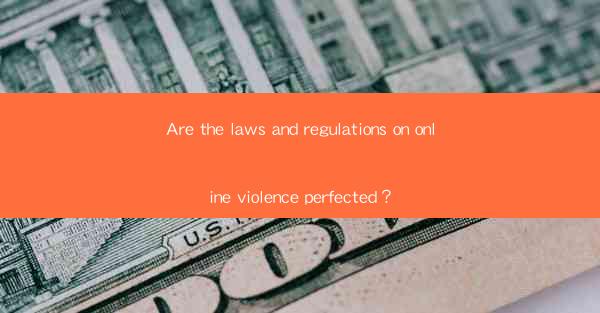
Are the Laws and Regulations on Online Violence Perfected?
The rise of the internet has brought about numerous advancements in communication, information sharing, and social interaction. However, it has also given rise to a new form of violence known as online violence. This includes cyberbullying, harassment, hate speech, and other forms of aggression that occur online. In response to this growing issue, governments and organizations around the world have implemented various laws and regulations to combat online violence. But are these laws and regulations truly perfected? This article will explore various aspects of online violence and the effectiveness of existing laws and regulations in addressing this issue.
Understanding Online Violence
Online violence refers to any form of aggression, harassment, or harm that occurs online. It can take many forms, including:
- Cyberbullying: The use of digital communication to harm, intimidate, or humiliate someone.
- Harassment: Repeated and unwanted behavior that causes distress or fear.
- Hate Speech: Speech that promotes hatred or discrimination against a person or group based on their race, religion, gender, sexual orientation, or other characteristics.
- Trolling: The act of deliberately posting inflammatory, offensive, or misleading content online with the intent to provoke a negative reaction.
- Doxing: The act of publicly releasing someone's personal information without their consent.
- Catfishing: The act of creating a fake online persona to deceive someone into forming a personal or romantic relationship.
Understanding the various forms of online violence is crucial in developing effective laws and regulations to combat this issue.
The Need for Laws and Regulations
The need for laws and regulations on online violence is evident for several reasons:
- Preventing Harm: Online violence can cause significant emotional, psychological, and even physical harm to its victims.
- Protecting Privacy: Online violence often involves the unauthorized release of personal information, which can lead to identity theft and other forms of exploitation.
- Maintaining Social Order: Online violence can disrupt social order and create a toxic online environment that hinders constructive communication and collaboration.
- Promoting Accountability: Laws and regulations can hold individuals and organizations accountable for their actions, thereby deterring online violence.
Given these reasons, it is essential to have comprehensive laws and regulations in place to address online violence.
Existing Laws and Regulations
Several laws and regulations have been implemented to combat online violence. These include:
- Cybercrime Laws: Many countries have enacted cybercrime laws that specifically address online violence, including cyberbullying, harassment, and hate speech.
- Data Protection Laws: Data protection laws, such as the General Data Protection Regulation (GDPR) in the European Union, aim to protect individuals' personal information from unauthorized access and use.
- Social Media Policies: Many social media platforms have implemented policies to address online violence, including the removal of harmful content and the suspension of accounts engaged in such behavior.
- International Agreements: International agreements, such as the United Nations' Declaration of Human Rights, recognize the right to freedom of expression but also emphasize the importance of protecting individuals from online violence.
While these laws and regulations provide a framework for addressing online violence, their effectiveness varies.
Challenges in Enforcing Online Violence Laws
Enforcing laws and regulations on online violence presents several challenges:
- Global Nature of Online Violence: Online violence can occur across borders, making it difficult for authorities to enforce laws effectively.
- Anonymity: The anonymity provided by the internet can make it difficult to identify and hold individuals accountable for their actions.
- Technological Advancements: As technology evolves, new forms of online violence emerge, making it challenging for laws and regulations to keep pace.
- Cultural Differences: Different cultures may have varying perceptions of online violence, making it difficult to develop universally applicable laws.
These challenges highlight the need for ongoing efforts to improve the effectiveness of existing laws and regulations.
Improving the Effectiveness of Online Violence Laws
To improve the effectiveness of online violence laws, several measures can be taken:
- International Cooperation: Governments and organizations should collaborate to develop international agreements and standards for addressing online violence.
- Public Awareness: Raising public awareness about the consequences of online violence can help deter individuals from engaging in such behavior.
- Education: Educating individuals about responsible online behavior can help prevent online violence and promote a more positive online environment.
- Technology Solutions: Developing and implementing technology solutions, such as artificial intelligence and machine learning, can help identify and remove harmful content more efficiently.
- Regular Updates: Laws and regulations should be regularly reviewed and updated to address new forms of online violence and emerging challenges.
By implementing these measures, it is possible to improve the effectiveness of online violence laws and regulations.
Conclusion
The issue of online violence is a complex and evolving challenge that requires a multifaceted approach. While laws and regulations have been implemented to address this issue, their effectiveness varies. To truly combat online violence, governments, organizations, and individuals must work together to improve the existing framework. By understanding the various forms of online violence, addressing the challenges in enforcing laws, and implementing measures to improve the effectiveness of existing regulations, it is possible to create a safer and more respectful online environment for everyone.











